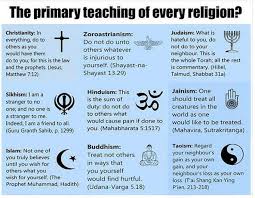While religions and religious groups may vary in their practices and beliefs, the Golden Rule, also known as the Ethic of Reciprocity, is routinely a part of their philosophies and beliefs.
| Buddhism | Hurt not others in way that you yourself would find hurtful. | Udana-Varga 5,1 |
| Christianity | All things whatsoever ye would that mean should do to you, do ye so to them; for this is the law and the prophets | Matthew 7:1 |
| Confucianism | Do not do to others what you would not like yourself. Then there will be no resentment against you, either in the family or in the state | Analects 12:1 |
| Hinduism | This is the sum of duty; do not onto others what you would not have them d unto you. | Mahabharata5,1517 |
| Islam | No one of you is a believer until he desires for his brother that which he desires for himself. | Sunnah |
| Judaism | What is hateful to you, do not do to your fellowman. This is the entire Law; all the rest is commentary. | Talmud |
| Native American Spirituality | All things are our relatives; what we do to everything, we do to ourselves. All is really One. | Black Elk |
| Taoism | Regard your neighbor’s gain as your gain, and your neighbor’s loss as your own loss. | Tai Shang Kan Yin P’ien |
| Zoroastrianism | That nature alone is good which refrains from doing to another whatsoever is not good for itself. | Dadisten-I-dinik, 94,5 |
Adapted from “The Christopher Newsletter”
